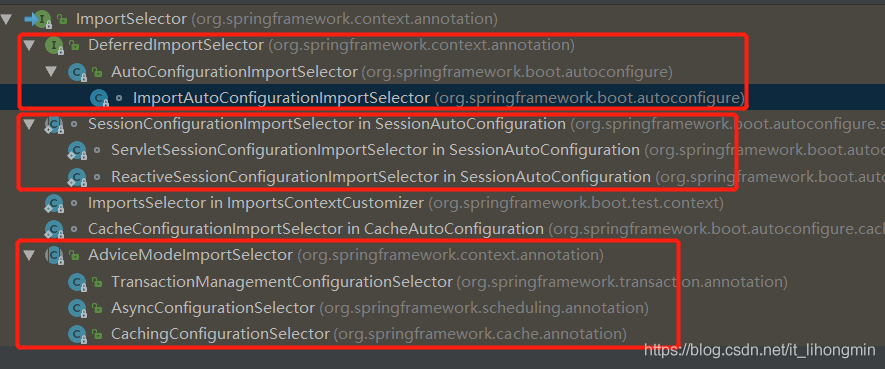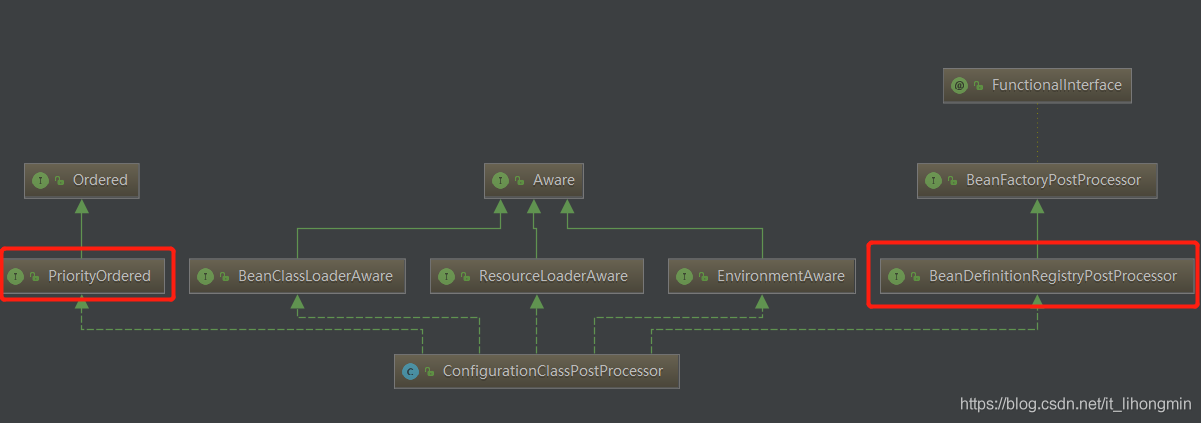public interface ImportSelector { /** * Select and return the names of which class(es) should be imported based on * the {@link AnnotationMetadata} of the importing @{@link Configuration} class. */ String[] selectImports(AnnotationMetadata importingClassMetadata); }
看一下该接口,注释说明,实现该接口的selectImport则返回的String[]的 class字符串 类将被注册为@Configuration,即只要实现该接口返回的类将被注入Spring容器。@see ImportBeanDefinitionRegistrar则说明是使用 ImportBeanDefinitionRegistrar的registerBeanDefinitions方法进行注入。看一下其直接继承的子类关系图:

大致分为五类(后续分析其他源码需要):
Spring boot的自动装配、测试、缓存自动装配、web相关。
Spring的aop相关的:@EnableTransactionManagement、@Async、@EnableCaching
下面以@EnableTransactionManagement主线进行梳理
只是从注释看是通过ImportBeanDefinitionRegistrar进行注入的,但是今天梳理了一下,发现源头还是从ApplicationContext的refresh模板模式方法(可以参见模板方法模式-简单实现和Spring中的使用分析)开始。
@Override public void refresh() throws BeansException, IllegalStateException { synchronized (this.startupShutdownMonitor) { // Prepare this context for refreshing. prepareRefresh(); // Tell the subclass to refresh the internal bean factory. ConfigurableListableBeanFactory beanFactory = obtainFreshBeanFactory(); // Prepare the bean factory for use in this context. prepareBeanFactory(beanFactory); try { // Allows post-processing of the bean factory in context subclasses. postProcessBeanFactory(beanFactory); // Invoke factory processors registered as beans in the context. invokeBeanFactoryPostProcessors(beanFactory); // Register bean processors that intercept bean creation. registerBeanPostProcessors(beanFactory); // Initialize message source for this context. initMessageSource(); // Initialize event multicaster for this context. initApplicationEventMulticaster(); // Initialize other special beans in specific context subclasses. onRefresh(); // Check for listener beans and register them. registerListeners(); // Instantiate all remaining (non-lazy-init) singletons. finishBeanFactoryInitialization(beanFactory); // Last step: publish corresponding event. finishRefresh(); } catch (BeansException ex) { if (logger.isWarnEnabled()) { logger.warn("Exception encountered during context initialization - " + "cancelling refresh attempt: " + ex); } // Destroy already created singletons to avoid dangling resources. destroyBeans(); // Reset 'active' flag. cancelRefresh(ex); // Propagate exception to caller. throw ex; } finally { // Reset common introspection caches in Spring's core, since we // might not ever need metadata for singleton beans anymore... resetCommonCaches(); } } }
模板方法第五步就是:
// Invoke factory processors registered as beans in the context. invokeBeanFactoryPostProcessors(beanFactory);
委派给PostProcessorRegistrationDelegate进行处理,方法很长都在从beanFactory中获取
public static void invokeBeanFactoryPostProcessors( ConfigurableListableBeanFactory beanFactory, List<BeanFactoryPostProcessor> beanFactoryPostProcessors) { // Invoke BeanDefinitionRegistryPostProcessors first, if any. Set<String> processedBeans = new HashSet<>(); if (beanFactory instanceof BeanDefinitionRegistry) { BeanDefinitionRegistry registry = (BeanDefinitionRegistry) beanFactory; List<BeanFactoryPostProcessor> regularPostProcessors = new ArrayList<>(); List<BeanDefinitionRegistryPostProcessor> registryProcessors = new ArrayList<>(); for (BeanFactoryPostProcessor postProcessor : beanFactoryPostProcessors) { if (postProcessor instanceof BeanDefinitionRegistryPostProcessor) { BeanDefinitionRegistryPostProcessor registryProcessor = (BeanDefinitionRegistryPostProcessor) postProcessor; registryProcessor.postProcessBeanDefinitionRegistry(registry); registryProcessors.add(registryProcessor); } else { regularPostProcessors.add(postProcessor); } } // Do not initialize FactoryBeans here: We need to leave all regular beans // uninitialized to let the bean factory post-processors apply to them! // Separate between BeanDefinitionRegistryPostProcessors that implement // PriorityOrdered, Ordered, and the rest. List<BeanDefinitionRegistryPostProcessor> currentRegistryProcessors = new ArrayList<>(); // First, invoke the BeanDefinitionRegistryPostProcessors that implement PriorityOrdered. String[] postProcessorNames = beanFactory.getBeanNamesForType(BeanDefinitionRegistryPostProcessor.class, true, false); for (String ppName : postProcessorNames) { if (beanFactory.isTypeMatch(ppName, PriorityOrdered.class)) { currentRegistryProcessors.add(beanFactory.getBean(ppName, BeanDefinitionRegistryPostProcessor.class)); processedBeans.add(ppName); } } sortPostProcessors(currentRegistryProcessors, beanFactory); registryProcessors.addAll(currentRegistryProcessors); // 执行到该处,处理 BeanDefinitionRegistryPostProcessor 类型的注册时,当前 // currentRegistryProcessors中包含了 ConfigurationClassPostParser 类型 invokeBeanDefinitionRegistryPostProcessors(currentRegistryProcessors, registry); currentRegistryProcessors.clear(); // Next, invoke the BeanDefinitionRegistryPostProcessors that implement Ordered. postProcessorNames = beanFactory.getBeanNamesForType(BeanDefinitionRegistryPostProcessor.class, true, false); for (String ppName : postProcessorNames) { if (!processedBeans.contains(ppName) && beanFactory.isTypeMatch(ppName, Ordered.class)) { currentRegistryProcessors.add(beanFactory.getBean(ppName, BeanDefinitionRegistryPostProcessor.class)); processedBeans.add(ppName); } } sortPostProcessors(currentRegistryProcessors, beanFactory); registryProcessors.addAll(currentRegistryProcessors); invokeBeanDefinitionRegistryPostProcessors(currentRegistryProcessors, registry); currentRegistryProcessors.clear(); // Finally, invoke all other BeanDefinitionRegistryPostProcessors until no further ones appear. boolean reiterate = true; while (reiterate) { reiterate = false; postProcessorNames = beanFactory.getBeanNamesForType(BeanDefinitionRegistryPostProcessor.class, true, false); for (String ppName : postProcessorNames) { if (!processedBeans.contains(ppName)) { currentRegistryProcessors.add(beanFactory.getBean(ppName, BeanDefinitionRegistryPostProcessor.class)); processedBeans.add(ppName); reiterate = true; } } sortPostProcessors(currentRegistryProcessors, beanFactory); registryProcessors.addAll(currentRegistryProcessors); invokeBeanDefinitionRegistryPostProcessors(currentRegistryProcessors, registry); currentRegistryProcessors.clear(); } // Now, invoke the postProcessBeanFactory callback of all processors handled so far. invokeBeanFactoryPostProcessors(registryProcessors, beanFactory); invokeBeanFactoryPostProcessors(regularPostProcessors, beanFactory); } else { // Invoke factory processors registered with the context instance. invokeBeanFactoryPostProcessors(beanFactoryPostProcessors, beanFactory); } // Do not initialize FactoryBeans here: We need to leave all regular beans // uninitialized to let the bean factory post-processors apply to them! String[] postProcessorNames = beanFactory.getBeanNamesForType(BeanFactoryPostProcessor.class, true, false); // Separate between BeanFactoryPostProcessors that implement PriorityOrdered, // Ordered, and the rest. List<BeanFactoryPostProcessor> priorityOrderedPostProcessors = new ArrayList<>(); List<String> orderedPostProcessorNames = new ArrayList<>(); List<String> nonOrderedPostProcessorNames = new ArrayList<>(); for (String ppName : postProcessorNames) { if (processedBeans.contains(ppName)) { // skip - already processed in first phase above } else if (beanFactory.isTypeMatch(ppName, PriorityOrdered.class)) { priorityOrderedPostProcessors.add(beanFactory.getBean(ppName, BeanFactoryPostProcessor.class)); } else if (beanFactory.isTypeMatch(ppName, Ordered.class)) { orderedPostProcessorNames.add(ppName); } else { nonOrderedPostProcessorNames.add(ppName); } } // First, invoke the BeanFactoryPostProcessors that implement PriorityOrdered. sortPostProcessors(priorityOrderedPostProcessors, beanFactory); invokeBeanFactoryPostProcessors(priorityOrderedPostProcessors, beanFactory); // Next, invoke the BeanFactoryPostProcessors that implement Ordered. List<BeanFactoryPostProcessor> orderedPostProcessors = new ArrayList<>(orderedPostProcessorNames.size()); for (String postProcessorName : orderedPostProcessorNames) { orderedPostProcessors.add(beanFactory.getBean(postProcessorName, BeanFactoryPostProcessor.class)); } sortPostProcessors(orderedPostProcessors, beanFactory); invokeBeanFactoryPostProcessors(orderedPostProcessors, beanFactory); // Finally, invoke all other BeanFactoryPostProcessors. List<BeanFactoryPostProcessor> nonOrderedPostProcessors = new ArrayList<>(nonOrderedPostProcessorNames.size()); for (String postProcessorName : nonOrderedPostProcessorNames) { nonOrderedPostProcessors.add(beanFactory.getBean(postProcessorName, BeanFactoryPostProcessor.class)); } invokeBeanFactoryPostProcessors(nonOrderedPostProcessors, beanFactory); // Clear cached merged bean definitions since the post-processors might have // modified the original metadata, e.g. replacing placeholders in values... beanFactory.clearMetadataCache(); }
重要的点在:
// 执行到该处,处理 BeanDefinitionRegistryPostProcessor 类型的注册时,当前 // currentRegistryProcessors中包含了 ConfigurationClassPostParser 类型 invokeBeanDefinitionRegistryPostProcessors(currentRegistryProcessors, registry);
执行到该处是,先从beanFactory中获取 BeanDefinitionRegistryPostProcessor类型或者子类的bean名称,再判断是否为PriorityOrdered类型,最好获取到了 ConfigurationClassPostProcessor先看看结构,符合上面的判断:

private static void invokeBeanDefinitionRegistryPostProcessors( Collection<? extends BeanDefinitionRegistryPostProcessor> postProcessors, BeanDefinitionRegistry registry) { for (BeanDefinitionRegistryPostProcessor postProcessor : postProcessors) { postProcessor.postProcessBeanDefinitionRegistry(registry); } }
调用ConfigurationClassPostProcessor的postProcessBeanDefinitionRegistry方法:
@Override public void postProcessBeanDefinitionRegistry(BeanDefinitionRegistry registry) { int registryId = System.identityHashCode(registry); if (this.registriesPostProcessed.contains(registryId)) { throw new IllegalStateException( "postProcessBeanDefinitionRegistry already called on this post-processor against " + registry); } if (this.factoriesPostProcessed.contains(registryId)) { throw new IllegalStateException( "postProcessBeanFactory already called on this post-processor against " + registry); } this.registriesPostProcessed.add(registryId); processConfigBeanDefinitions(registry); }
执行: processConfigBeanDefinitions方法
public void processConfigBeanDefinitions(BeanDefinitionRegistry registry) { List<BeanDefinitionHolder> configCandidates = new ArrayList(); String[] candidateNames = registry.getBeanDefinitionNames(); String[] var4 = candidateNames; int var5 = candidateNames.length; for(int var6 = 0; var6 < var5; ++var6) { String beanName = var4[var6]; BeanDefinition beanDef = registry.getBeanDefinition(beanName); if (beanDef.getAttribute(ConfigurationClassUtils.CONFIGURATION_CLASS_ATTRIBUTE) != null) { if (this.logger.isDebugEnabled()) { this.logger.debug("Bean definition has already been processed as a configuration class: " + beanDef); } } else if (ConfigurationClassUtils.checkConfigurationClassCandidate(beanDef, this.metadataReaderFactory)) { configCandidates.add(new BeanDefinitionHolder(beanDef, beanName)); } } if (!configCandidates.isEmpty()) { configCandidates.sort((bd1, bd2) -> { int i1 = ConfigurationClassUtils.getOrder(bd1.getBeanDefinition()); int i2 = ConfigurationClassUtils.getOrder(bd2.getBeanDefinition()); return Integer.compare(i1, i2); }); SingletonBeanRegistry sbr = null; if (registry instanceof SingletonBeanRegistry) { sbr = (SingletonBeanRegistry)registry; if (!this.localBeanNameGeneratorSet) { BeanNameGenerator generator = (BeanNameGenerator)sbr.getSingleton("org.springframework.context.annotation.internalConfigurationBeanNameGenerator"); if (generator != null) { this.componentScanBeanNameGenerator = generator; this.importBeanNameGenerator = generator; } } } if (this.environment == null) { this.environment = new StandardEnvironment(); } ConfigurationClassParser parser = new ConfigurationClassParser(this.metadataReaderFactory, this.problemReporter, this.environment, this.resourceLoader, this.componentScanBeanNameGenerator, registry); Set<BeanDefinitionHolder> candidates = new LinkedHashSet(configCandidates); HashSet alreadyParsed = new HashSet(configCandidates.size()); do { parser.parse(candidates); parser.validate(); Set<ConfigurationClass> configClasses = new LinkedHashSet(parser.getConfigurationClasses()); configClasses.removeAll(alreadyParsed); if (this.reader == null) { this.reader = new ConfigurationClassBeanDefinitionReader(registry, this.sourceExtractor, this.resourceLoader, this.environment, this.importBeanNameGenerator, parser.getImportRegistry()); } this.reader.loadBeanDefinitions(configClasses); alreadyParsed.addAll(configClasses); candidates.clear(); if (registry.getBeanDefinitionCount() > candidateNames.length) { String[] newCandidateNames = registry.getBeanDefinitionNames(); Set<String> oldCandidateNames = new HashSet(Arrays.asList(candidateNames)); Set<String> alreadyParsedClasses = new HashSet(); Iterator var12 = alreadyParsed.iterator(); while(var12.hasNext()) { ConfigurationClass configurationClass = (ConfigurationClass)var12.next(); alreadyParsedClasses.add(configurationClass.getMetadata().getClassName()); } String[] var23 = newCandidateNames; int var24 = newCandidateNames.length; for(int var14 = 0; var14 < var24; ++var14) { String candidateName = var23[var14]; if (!oldCandidateNames.contains(candidateName)) { BeanDefinition bd = registry.getBeanDefinition(candidateName); if (ConfigurationClassUtils.checkConfigurationClassCandidate(bd, this.metadataReaderFactory) && !alreadyParsedClasses.contains(bd.getBeanClassName())) { candidates.add(new BeanDefinitionHolder(bd, candidateName)); } } } candidateNames = newCandidateNames; } } while(!candidates.isEmpty()); if (sbr != null && !sbr.containsSingleton(IMPORT_REGISTRY_BEAN_NAME)) { sbr.registerSingleton(IMPORT_REGISTRY_BEAN_NAME, parser.getImportRegistry()); } if (this.metadataReaderFactory instanceof CachingMetadataReaderFactory) { ((CachingMetadataReaderFactory)this.metadataReaderFactory).clearCache(); } } }

则真正执行的是 ConfigurationClassParser的parse方法
public void parse(Set<BeanDefinitionHolder> configCandidates) { for (BeanDefinitionHolder holder : configCandidates) { BeanDefinition bd = holder.getBeanDefinition(); try { if (bd instanceof AnnotatedBeanDefinition) { parse(((AnnotatedBeanDefinition) bd).getMetadata(), holder.getBeanName()); } else if (bd instanceof AbstractBeanDefinition && ((AbstractBeanDefinition) bd).hasBeanClass()) { parse(((AbstractBeanDefinition) bd).getBeanClass(), holder.getBeanName()); } else { parse(bd.getBeanClassName(), holder.getBeanName()); } } catch (BeanDefinitionStoreException ex) { throw ex; } catch (Throwable ex) { throw new BeanDefinitionStoreException( "Failed to parse configuration class [" + bd.getBeanClassName() + "]", ex); } } this.deferredImportSelectorHandler.process(); }
this.deferredImportSelectorHandler.process();
public void process() { List<DeferredImportSelectorHolder> deferredImports = this.deferredImportSelectors; this.deferredImportSelectors = null; try { if (deferredImports != null) { DeferredImportSelectorGroupingHandler handler = new DeferredImportSelectorGroupingHandler(); deferredImports.sort(DEFERRED_IMPORT_COMPARATOR); deferredImports.forEach(handler::register); handler.processGroupImports(); } } finally { this.deferredImportSelectors = new ArrayList<>(); } }
handler.processGroupImports();
public void processGroupImports() { for (DeferredImportSelectorGrouping grouping : this.groupings.values()) { grouping.getImports().forEach(entry -> { ConfigurationClass configurationClass = this.configurationClasses.get( entry.getMetadata()); try { processImports(configurationClass, asSourceClass(configurationClass), asSourceClasses(entry.getImportClassName()), false); } catch (BeanDefinitionStoreException ex) { throw ex; } catch (Throwable ex) { throw new BeanDefinitionStoreException( "Failed to process import candidates for configuration class [" + configurationClass.getMetadata().getClassName() + "]", ex); } }); } }
processImports(configurationClass, asSourceClass(configurationClass),asSourceClasses(entry.getImportClassName()), false);
private void processImports(ConfigurationClass configClass, SourceClass currentSourceClass, Collection<SourceClass> importCandidates, boolean checkForCircularImports) { if (importCandidates.isEmpty()) { return; } if (checkForCircularImports && isChainedImportOnStack(configClass)) { this.problemReporter.error(new CircularImportProblem(configClass, this.importStack)); } else { this.importStack.push(configClass); try { for (SourceClass candidate : importCandidates) { if (candidate.isAssignable(ImportSelector.class)) { // Candidate class is an ImportSelector -> delegate to it to determine imports Class<?> candidateClass = candidate.loadClass(); ImportSelector selector = ParserStrategyUtils.instantiateClass(candidateClass, ImportSelector.class, this.environment, this.resourceLoader, this.registry); if (selector instanceof DeferredImportSelector) { this.deferredImportSelectorHandler.handle(configClass, (DeferredImportSelector) selector); } else { String[] importClassNames = selector.selectImports(currentSourceClass.getMetadata()); Collection<SourceClass> importSourceClasses = asSourceClasses(importClassNames); processImports(configClass, currentSourceClass, importSourceClasses, false); } } else if (candidate.isAssignable(ImportBeanDefinitionRegistrar.class)) { // Candidate class is an ImportBeanDefinitionRegistrar -> // delegate to it to register additional bean definitions Class<?> candidateClass = candidate.loadClass(); ImportBeanDefinitionRegistrar registrar = ParserStrategyUtils.instantiateClass(candidateClass, ImportBeanDefinitionRegistrar.class, this.environment, this.resourceLoader, this.registry); configClass.addImportBeanDefinitionRegistrar(registrar, currentSourceClass.getMetadata()); } else { // Candidate class not an ImportSelector or ImportBeanDefinitionRegistrar -> // process it as an @Configuration class this.importStack.registerImport( currentSourceClass.getMetadata(), candidate.getMetadata().getClassName()); processConfigurationClass(candidate.asConfigClass(configClass)); } } } catch (BeanDefinitionStoreException ex) { throw ex; } catch (Throwable ex) { throw new BeanDefinitionStoreException( "Failed to process import candidates for configuration class [" + configClass.getMetadata().getClassName() + "]", ex); } finally { this.importStack.pop(); } } }
processConfigurationClass(candidate.asConfigClass(configClass));
protected void processConfigurationClass(ConfigurationClass configClass) throws IOException { if (this.conditionEvaluator.shouldSkip(configClass.getMetadata(), ConfigurationPhase.PARSE_CONFIGURATION)) { return; } ConfigurationClass existingClass = this.configurationClasses.get(configClass); if (existingClass != null) { if (configClass.isImported()) { if (existingClass.isImported()) { existingClass.mergeImportedBy(configClass); } // Otherwise ignore new imported config class; existing non-imported class overrides it. return; } else { // Explicit bean definition found, probably replacing an import. // Let's remove the old one and go with the new one. this.configurationClasses.remove(configClass); this.knownSuperclasses.values().removeIf(configClass::equals); } } // Recursively process the configuration class and its superclass hierarchy. SourceClass sourceClass = asSourceClass(configClass); do { sourceClass = doProcessConfigurationClass(configClass, sourceClass); } while (sourceClass != null); this.configurationClasses.put(configClass, configClass); }
do { sourceClass = doProcessConfigurationClass(configClass, sourceClass); }
protected final SourceClass doProcessConfigurationClass(ConfigurationClass configClass, SourceClass sourceClass) throws IOException { if (configClass.getMetadata().isAnnotated(Component.class.getName())) { // Recursively process any member (nested) classes first processMemberClasses(configClass, sourceClass); } // Process any @PropertySource annotations for (AnnotationAttributes propertySource : AnnotationConfigUtils.attributesForRepeatable( sourceClass.getMetadata(), PropertySources.class, org.springframework.context.annotation.PropertySource.class)) { if (this.environment instanceof ConfigurableEnvironment) { processPropertySource(propertySource); } else { logger.info("Ignoring @PropertySource annotation on [" + sourceClass.getMetadata().getClassName() + "]. Reason: Environment must implement ConfigurableEnvironment"); } } // Process any @ComponentScan annotations Set<AnnotationAttributes> componentScans = AnnotationConfigUtils.attributesForRepeatable( sourceClass.getMetadata(), ComponentScans.class, ComponentScan.class); if (!componentScans.isEmpty() && !this.conditionEvaluator.shouldSkip(sourceClass.getMetadata(), ConfigurationPhase.REGISTER_BEAN)) { for (AnnotationAttributes componentScan : componentScans) { // The config class is annotated with @ComponentScan -> perform the scan immediately Set<BeanDefinitionHolder> scannedBeanDefinitions = this.componentScanParser.parse(componentScan, sourceClass.getMetadata().getClassName()); // Check the set of scanned definitions for any further config classes and parse recursively if needed for (BeanDefinitionHolder holder : scannedBeanDefinitions) { BeanDefinition bdCand = holder.getBeanDefinition().getOriginatingBeanDefinition(); if (bdCand == null) { bdCand = holder.getBeanDefinition(); } if (ConfigurationClassUtils.checkConfigurationClassCandidate(bdCand, this.metadataReaderFactory)) { parse(bdCand.getBeanClassName(), holder.getBeanName()); } } } } }
// Process any @Import annotations processImports(configClass, sourceClass, getImports(sourceClass), true); // Process any @ImportResource annotations ......
最后:
private void processImports(ConfigurationClass configClass, SourceClass currentSourceClass, Collection<SourceClass> importCandidates, boolean checkForCircularImports) { if (importCandidates.isEmpty()) { return; } if (checkForCircularImports && isChainedImportOnStack(configClass)) { this.problemReporter.error(new CircularImportProblem(configClass, this.importStack)); } else { this.importStack.push(configClass); try { for (SourceClass candidate : importCandidates) { if (candidate.isAssignable(ImportSelector.class)) { // Candidate class is an ImportSelector -> delegate to it to determine imports Class<?> candidateClass = candidate.loadClass(); ImportSelector selector = ParserStrategyUtils.instantiateClass(candidateClass, ImportSelector.class, this.environment, this.resourceLoader, this.registry); if (selector instanceof DeferredImportSelector) { this.deferredImportSelectorHandler.handle(configClass, (DeferredImportSelector) selector); } else { String[] importClassNames = selector.selectImports(currentSourceClass.getMetadata()); Collection<SourceClass> importSourceClasses = asSourceClasses(importClassNames); processImports(configClass, currentSourceClass, importSourceClasses, false); } } else if (candidate.isAssignable(ImportBeanDefinitionRegistrar.class)) { // Candidate class is an ImportBeanDefinitionRegistrar -> // delegate to it to register additional bean definitions Class<?> candidateClass = candidate.loadClass(); ImportBeanDefinitionRegistrar registrar = ParserStrategyUtils.instantiateClass(candidateClass, ImportBeanDefinitionRegistrar.class, this.environment, this.resourceLoader, this.registry); configClass.addImportBeanDefinitionRegistrar(registrar, currentSourceClass.getMetadata()); } else { // Candidate class not an ImportSelector or ImportBeanDefinitionRegistrar -> // process it as an @Configuration class this.importStack.registerImport( currentSourceClass.getMetadata(), candidate.getMetadata().getClassName()); processConfigurationClass(candidate.asConfigClass(configClass)); } } } catch (BeanDefinitionStoreException ex) { throw ex; } catch (Throwable ex) { throw new BeanDefinitionStoreException( "Failed to process import candidates for configuration class [" + configClass.getMetadata().getClassName() + "]", ex); } finally { this.importStack.pop(); } } }
重点是:
1、当前的importCandidates对象为:TransactionManagementConfigurationSelector
2、查找ImportSelect.class类型
3、使用了工具类型进行处理 ParserStrategyUtils.instantiateClass
4、注入容器中
流程总结:
invokeBeanFactoryPostProcessors
PostProcessorRegistrationDelegate.invokeBeanFactoryPostProcessors
invokeBeanDefinitionRegistryPostProcessors
ConfigurationClassPostParser.postProcessBeanDefinitionRegistry
processConfigBeanDefinitions
ConfigurationClassParser.parse
parse(@Nullable String className, String beanName)
processConfigurationClass
doProcessConfigurationClass
processImports
ParserStrategyUtils.instantiateClass(candidateClass, ImportSelector.class,this.environment, this.resourceLoader, this.registry);
String[] importClassNames = selector.selectImports(currentSourceClass.getMetadata()); Collection<SourceClass> importSourceClasses = asSourceClasses(importClassNames); processImports(configClass, currentSourceClass, importSourceClasses, false);